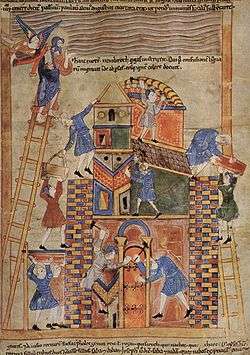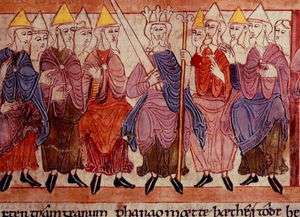Old English Hexateuch


The Old English Hexateuch is the collaborative project of the late Anglo-Saxon period that translated the six books of the Hexateuch into Old English, presumably under the editorship of Ælfric of Eynsham.[1] It is the first vernacular translation of the first six books of the Old Testament, i.e. the five books of the Torah (Genesis, Exodus, Leviticus, Numbers and Deuteronomy) and Joshua.
Manuscripts
The translation is retained in seven manuscripts, most of which are fragmentary. The best-known of those is a richly illuminated manuscript kept in London: British Library, Cotton MS Claudius B.iv. Another copy of the text, without lavish illustrations but including a translation of the Book of Judges (hence also called the Old English Heptateuch), is found in Oxford, Bodleian Library, Laud Misc. 509.
Claudius B.iv. was probably compiled in the second quarter of the 11th century at St Augustine's Abbey, Canterbury. It incorporates translations and a preface by Ælfric of Eynsham, while the remaining parts of the translation were carried out by anonymous authors. Peter Clemoes suggests that Byrhtferth of Ramsey was responsible for the compilation as well as for parts of the translation.
One or, more likely, several artists accompanied the narrative with 394 coloured drawings, containing about 550 scenes, many of which are unfinished, at varying stages of completion. The settings do not attempt to represent Old Testament life as anything different from that of contemporary Anglo-Saxons, and so give valuable depictions of many aspects of the Anglo-Saxon world. The extensive illustrations suggest that it was designed mainly for lay use.[2]
References
- Notes
- Works cited
- Dodwell, C. R., The Pictorial arts of the West, 800-1200, 1993, Yale UP, ISBN 0-300-06493-4
- Fox, Michael; Sharma, Manish (2012). "Introduction". In Michael, Fox. Old English Literature and the Old Testament. Manish Sharma. Toronto: U of Toronto P. pp. 3–24. ISBN 978-0-8020-9854-2.
Further reading
Editions
- Dodwell, C. R. & Clemoes, Peter (eds.). The Old English Illustrated Hexateuch. Early English Manuscripts in Facsimile; 18. Copenhagen: Rosenkilde & Bagger, 1974. Facsimile edition of British Library, Cotton MS Claudius B.iv.
- Crawford, Samuel J. (ed.). The Old English Version of the Heptateuch, Ælfric's Treatise on the Old and New Testament and His Preface to Genesis. Early English Text Society; 160. London: Oxford University Press, 1969. Critical edition of the text.
- Marsden, Richard (ed.). The Old English Heptateuch and Ælfric's "Libellus de veteri testamento et novo". Early English Text Society; 330. Oxford: Oxford U. P., 2008.
Secondary literature
- Barnhouse, Rebecca, and Benjamin C. Withers (eds.). The Old English Hexateuch: aspects and approaches. Kalamazoo: Medieval Institute, 2000.
- Mellinkoff, Ruth. "Serpent Imagery in the Illustrated Old English Hexateuch." Brown, P. R., et al. (eds.) Modes of Interpretation in Old English Literature: essays in honour of Stanley B. Greenfield / edited by Phyllis Rugg Brown. Toronto: University of Toronto Press, 1986.
- Withers, Benjamin C. The Illustrated Old English Hexateuch, Cotton Claudius B.iv.: the frontier of seeing and reading in Anglo-Saxon England. Studies in Book and Print Culture. London: British Library, 2007. ISBN 978-0-7123-0940-0.
- Withers, Benjamin C. "A 'secret and feverish genesis': the Prefaces of the Old English Hexateuch." The Art Bulletin; 81:1 (1999): 53-71.
See also
External links
![]() Media related to Old English Hexateuch at Wikimedia Commons
Media related to Old English Hexateuch at Wikimedia Commons